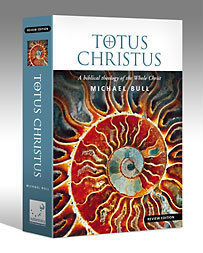Apr
10
2009
James B. Jordan, following the God-given office of Cyrus as shepherd over Israel (Isaiah 44:28), interprets Zechariah 11 as a prediction of events under Greek rule, rather than Roman:
“The wicked Hashmoneans took over the Temple for themselves, and did not give glory to God and restore the true High Priest. The Hashmoneans “buy” the Temple for thirty pieces of silver, but Yahweh rejects their offer, which treats Him and His people as slaves. These evils result in the Jews being broken apart and set at each other’s throats.”1
Either way, the pattern is the same, as the Jews’ apostasy under Greek rule was repeated under Rome, with the “Temple” they sold in the second instance being Christ Himself. Both “Greek” and “Roman” interpretations link the events of chapter 10 to chapter 12, and echo the judgments upon false shepherds by the pre-exile prophets. And in both cases, it is the “Temple” seen by Ezekiel that is being judged. The flock is divided and the Temple made desolate under Antiochus Epiphanes (Greece), and under Christ and Titus (Rome).
The most important factor is that in both events, the Jews’ compromise left them without a true High Priest, and thus no true Atonement.
_______________
See James B. Jordan, The Handwriting on the Wall, p. 585-587.
Comments Off | tags: Antiochus Epiphanes, Atonement, Compromise, Cyrus, Ezekiel's Temple, High Priest, Isaiah, James Jordan, Temple, Zechariah | posted in Biblical Theology
Apr
10
2009
 For the ancient world, a garden, a house, a city or a temple was like a woman. An invading army, after storming through the gates of a city, would rape the virgins. It was a brutal reminder that, like the women, the conquered city was not impregnable.
For the ancient world, a garden, a house, a city or a temple was like a woman. An invading army, after storming through the gates of a city, would rape the virgins. It was a brutal reminder that, like the women, the conquered city was not impregnable.
“In order to understand this, we have to think like ancient Hebrews, and not like modern people… Adam was supposed to guard the garden, and he was also supposed to guard his wife.
The Song of Solomon compares the woman to a garden several times in the course of the book. In all languages, the words for city, garden, and the like are feminine, and we speak of a city as “she” in English today.
Let us take a look at the city in the Bible, remembering that what is said of the city is also true of the house, tent, Temple, Tabernacle, and other enclosed homes for humanity. The city has walls and gates. The purpose of these walls and gates is to keep the enemy out. The goal is that the city be impregnable, and note that English word – it directly connects the city with the woman. Thus, the city has to be a virgin, sealed against attack. Jerusalem is referred to as an impregnable virgin repeatedly in Scripture (2 Kings 19:21; Is. 37:22; Jer. 14:17; 18:13; Jer. 31:21; Amos 5:2). The attack on Jerusalem is thus the rape of a city (Lam. 1:15; 2:13)… Just as Eve was “built” from Adam (using an architectural term, Gen. 2:22), so Jerusalem would be rebuilt as a virgin (Jer. 31:4)… Thus, the safety and security of the virgin daughters of Israel was a symbol of the safety and security of the whole land. Their inviolability corresponded to the inviolability of the whole culture (Lam. 1:4; 2:10).”
In the case of Babylon, its walls and gates were impregnable. The city was built on the Euphrates river, which ebbed into the city under the wall. Even the banks of the river were protected by metal gates from any invaders who could hold their breath long enough. Under Belshazzar, Babylon lost her virginity (Isaiah 47:1-3), and during the feast her river gates had been left open.
In a brilliant military manoeuvre, Cyrus the Great gave the signal for his troops upstream to divert the river. The invading army marched into the city dryshod and took it with little resistance. There were hints of this in the prophecies of both Isaiah (44:27) and Jeremiah (50:38, 51:36). The waters of the bringer of the “flood” were dried up. The Land was rising from the deep.
___________________
James B. Jordan (concerning the virginity of Jephthah’s daughter), Judges: God’s War Against Humanism, p. 211-212. Download from www.biblicalhorizons.com
Comments Off | tags: Babylon, Belshazzar, Cyrus, Greater Eve, James Jordan, Judges | posted in Biblical Theology, The Restoration Era, Totus Christus
Apr
10
2009
In recaptulating Israel’s history, the seven letters in Revelation 2-3 confirm that the true Israel was transformed by the death and resurrection of Christ, progressing from Firstfruits through Pentecost to Trumpets. James Jordan writes:
“[Bible chronology] is a history of how the Divine Parent educated the core and centre of the human race, and then of how He called all nations to be grafted into that Olive Tree history so as to receive the benefit of it… The human race had matured to the point where it was fitting for Messiah to come, and come not only to save the race, but to bring the race to maturity… And then we can notice that the seven churches in Revelation 2-3 are each associated with a particular time in Old Covenant history. We can begin to apply the societal wisdom we have begun to learn from Israel’s history to address the particular problems and issues in our own churches. Is your church most like Pergamum? Well, that’s the wilderness church. Perhaps your church is made up of people who need to be addressed in a Law-oriented fashion. If your church is like Thyatira, maybe a strong dose of Psalms. If like Sardis, you need Jeremiah. And so forth.”
http://www.biblicalhorizons.com/biblical-horizons/no-195-how-to-do-reformed-theology-nowadays-part-4/
Comments Off | tags: Bible Chronology, Bible history, Feasts, James Jordan, Psalms, Revelation | posted in Biblical Theology, Totus Christus
Apr
10
2009
“A river of fire was flowing and coming forth from before him…”
Daniel 7:10
This aspect of the vision points us back to Jacob’s ladder, which had angels ascending and descending upon it (Genesis 28:12). These are angels who bear the flaming sword of Genesis 3, which bars mankind from paradise, but which also mediates between God and mankind when it comes down from His throne to light the fire on His earthly altar (Leviticus 9:24; 2 Chronicles 7:1). Fulfilling the prophecy, it is the fire that came down from Jesus on the day of Pentecost to light the fire on His new altar-people (Acts 2), which is pictured again in Revelation 8:3-5.
James B. Jordan, The Handwriting on the Wall, p. 392.
Available from www.americanvision.org
Comments Off | tags: Daniel, James Jordan | posted in Biblical Theology, Quotes
Apr
10
2009

“And he carried me away in the Spirit into a wilderness, and I saw a woman sitting on a scarlet beast that was full of blasphemous names, and it had seven heads and ten horns.
The woman was arrayed in purple and scarlet, and adorned with gold and jewels and pearls, holding in her hand a golden cup full of abominations and the impurities of her sexual immorality. And on her forehead was written a name of mystery: “Babylon the great, mother of prostitutes and of the Land’s abominations.” (from Revelation 17)
The woman’s riches and robe are described after her “bestial relations.” She made her priestly office into a counterfeit kingdom. She thought she was rich, but was in fact poor, blind and naked.
Continue reading
Comments Off | tags: James Jordan, Jezebel, Revelation, Satan | posted in Biblical Theology, The Last Days, Totus Christus
Apr
10
2009
The modern tendency is to read the Bible only to find out what it says to men as individuals. The Scripture is consulted only to find out what the Bible says to me, about me, for me, and so forth. Clearly there is nothing wrong with this in itself, but it produces a warped view of the Bible if this is the only way it is read. The Bible, God’s written revelation, speaks not only about individual matters, but also about social and cosmic (creation-al) matters as well. This is because the Bible, while it is man-oriented, is God-centered.
James Jordan, The Law of the Covenant www.biblicalhorizons.com
Comments Off | tags: James Jordan | posted in Biblical Theology, Quotes
Apr
10
2009
Problems with Church History Studies
One striking aspect of the recent “Federal Vision” conflict in the various conservative micro-Reformed groups is a debate over what older theologiansreally meant and said. Examining the credentials of various people who speak with great assurance on these matters one sees repeatedly degrees in church/theology history studies. In fact, in Reformed circles, it seems that about the only advanced degrees offered are in historical studies.
I should like to offer what I regard as a considerable caveat. I do not believe that men who sing pop choruses or plodding Trinity Hymnal songs on Sunday can get very far into Luther or Calvin, or for that matter Turretin. Men whose personal opinion is that society can be left to the devil cannot really get into the outlook of the Reformers.
I submit that it is important to have some feel for what people were singing and how they were singing it at various times in history. Is it a coincidence that “Reformed scholasticism” began to develop at the same time that the fiery dance-like chorales and psalms of the Reformation began to die down into slow, plodding, even-note mush? It is a coincidence that the “Puritans” had problems with assurance of salvation, given their destruction of enthusiastic singing? I don’t think so. People who sing the psalms as real war chants, as war dances that precede battle, don’t have problems with assurance and don’t have time for scholasticism. Neither do people with strong, fully-sung liturgies.
Obviously, much can be understood by reading the writings left by various historical personages. But without understanding the songs they sang, from the inside, we will not have the Spirit that they had, and our understanding will be incomplete and flawed.
James B. Jordan, http://biblicalhorizons.wordpress.com
Comments Off | tags: Federal Vision, James Jordan, Music, Puritans | posted in Biblical Theology, Christian Life
Apr
10
2009
You will remember that St. Paul is another Jonah and he takes the Gospel to the Gentiles. He forsakes the Jews and, in fact, at the end of Acts 28, he really casts them off and says judgment has come upon them to the uttermost. Of course, a few years later it does—in the destruction of Jerusalem. Yet Paul says, if it were possible, I wish that I could be damned for my brethren in Israel.
Paul had the same attitude as Jonah had, of wanting to see his own people saved. But unlike Jonah, Paul is willing to obey God… he sees that God has compassion on the Gentiles in and of themselves. Jonah, however, has to be persuaded of this. Jonah is so concerned about his own congregation back home that he doesn’t want to take the Gospel elsewhere for fear that it will have bad results in Israel.
James B. Jordan, The Book of Jonah lectures www.wordmp3.com
Comments Off | tags: James Jordan, Jonah, Paul | posted in Biblical Theology, Quotes
Apr
10
2009
The prime mover in history is always God. God creates the world and tells men what to do, and men do it, and then God comes and judges them, and tells them to do something else. History moves when God speaks. That is the reason preaching is so important. When the word of God is sounded out into a culture, history begins to move. People can no longer remain neutral, or pretend to be neutral.
James B. Jordan, The Book of Jonah lectures www.wordmp3.com
Comments Off | tags: Culture, James Jordan, Jonah, Preaching | posted in Biblical Theology, Quotes
Apr
10
2009
 After the altar was rebuilt and the foundation for the Temple was restored, local opposition and intimidation brought a halt to construction. God’s people compromised and there was peace, but it was the stillness of stagnant water. The Lord used two witnesses, Haggai and Zechariah, as shoulders to lift the capstone.
After the altar was rebuilt and the foundation for the Temple was restored, local opposition and intimidation brought a halt to construction. God’s people compromised and there was peace, but it was the stillness of stagnant water. The Lord used two witnesses, Haggai and Zechariah, as shoulders to lift the capstone.
Haggai dealt with the practical consequences of the people’s failure to complete the Temple. No matter how hard they worked, the Lord made sure their pockets had holes. Without making the house of God a priority they could not prosper. Haggai also encouraged them with promises, which included a prediction that the Lord would soon shake the nations and bring their riches to Judah. James Jordan pictures this as the Lord holding a man upside down and shaking all the money out of his pockets.
Yet now be strong, O Zerubbabel, declares the Lord. Be strong, O Joshua, son of Jehozadak, the high priest. Be strong, all you people of the land, declares the Lord. Work, for I am with you, declares the Lord of hosts, according to the covenant that I made with you when you came out of Egypt. My Spirit remains in your midst. Fear not. For thus says the Lord of hosts: Yet once more, in a little while, I will shake the heavens and the earth and the sea and the dry land. And I will shake all nations, so that the treasures of all nations shall come in, and I will fill this house with glory, says the Lord of hosts… (Haggai 2:4-7)
The fulfilment of this is recorded in the book of Esther. The author of Hebrews understood the pattern. He quoted Haggai before the next great plunder of the Lord’s enemies (Hebrews 12:26), but in that day the plunder, and the house, would be spiritual and eternal.
Comments Off | tags: Haggai, James Jordan, Zechariah | posted in The Restoration Era, Totus Christus




























